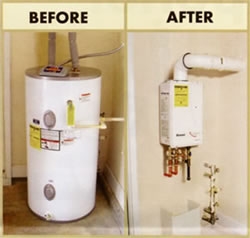Anyone who has ever watched a family sitcom knows the old trope about hot water being a precious commodity in a household of multiple people. Hilarious arguments are had over how much time each person is allowed to have in the shower so the hot water doesn’t run out for the next person. This, like most things on TV, is an exaggeration for the sake of comedy, but it’s not that far from reality. Traditional water heaters work by storing water in a tank and keeping that water at a
constant hot temperature. When the hot water that’s kept in the tank runs out, the user is at the mercy of waiting for the tank to heat up another batch of water. Increasingly, homeowners are opting for a “tankless” water heater. One which heats the water on-demand and doesn’t require a reservoir that has to be constantly heated in order to keep it at an appropriate temperature. When the faucet is turned off, the water stops flowing and the burner stops heating as well. Tankless water heaters provide an essentially endless supply of hot water without requiring energy to be used when the heater isn’t in use.
Tankless water heaters have pros and cons, just like their traditional cylindrical counterparts. Going with tankless might save a typical family about $75 a year in energy costs, but the tradeoff is an
increased up-front cost for the tankless sytem of between $500 and $1000 over traditional water heaters.
The main benefit of a tankless water heater is convenience, the value of which might change from one person to the next. Having a limitless supply of hot water for anyone who wants it, even while other devices like a dishwasher are running is, for many people, well worth the cost of upgrading to tankless water heater. There’s also the issue of space, a tankless water heater requires much less floor space than the large cylindrical tubes and in many case can be mounted directly to the wall without needing to sit on the floor at all.
Even though convenience and personal comfort is the primary appeal of tankless water heater systems, those concerned about overall energy consumption and their individual footprint will find that tankless water heaters do use less overall energy than traditional systems.
The important thing to realize is that switching to a tankless water heater is not for everyone. But if the idea of never having to worry about running out of hot water again all while ultimately decreasing the impact to the environment by using less energy sounds appealing, it might be time to consider investing in a tankless water heater.
If you’re looking to upgrade to a tankless system or need tankless water heater installation or repair and need a plumber in Louisville, KY, give ASI Plumbing a call!


 Over 1800 Trusted Reviews
Over 1800 Trusted Reviews 


